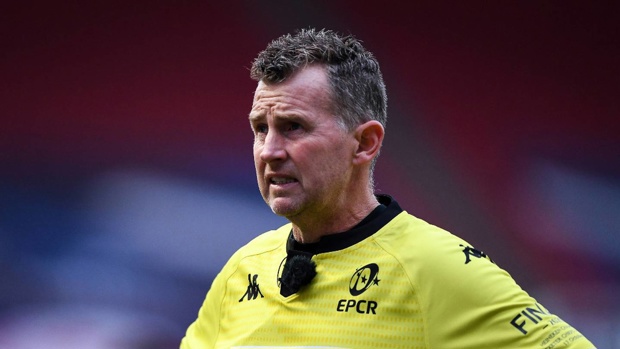The rule changes rugby needs right now
- Publish Date
- Wednesday, 23 March 2022, 9:52AM

By Nigel Owens
Now the Six Nations has wrapped up, some flaws with the recently introduced 50:22 kicks and goal-line dropout laws need to be addressed.
There have been some good instances of 50:22 kicks, but we need to look at the bigger picture of why the law was brought in, which was to try to get teams to drop back a defender or two to prevent 50:22 kicks from happening, therefore creating more space in midfield to encourage teams to attack.
The kicks themselves are an impressive bit of skill, but have they actually opened up the game? You can't say that this year's Six Nations has been more open with more attacking rugby because of the 50:22.
To make it more effective, we need to be stricter about players staying on their feet at the contact area. Tacklers are going in to win turnovers and just being dragged to the ground by the attacking side, which means the tackler has to let the ball go.
The attacking side commits two, sometimes three players to the ruck to secure possession, but the defending side often decide not to continue contesting, and you end up with more defensive players on their feet, fanning out to cover the space, than attackers.
It's illegal to pull a player down in that contact area, so until the officials deal with that more strictly, we are not going to see the full benefits of the 50:22 in terms of creating more space for attacking rugby. The law should stay, and the ruck law should be refereed.
As for goal-line dropouts, I was a big fan initially because I felt it would prevent attacking teams from numerous pick-and-gos near the try line, with teams instead attempting to move the ball wide to avoid being held up and losing possession. But I'm not sure it has worked as planned.
We still see plenty of pick-and-gos until teams get over, we still see plenty of mauls and the number of collisions hasn't decreased.
We are also seeing fewer scrums near the goal line, and to be honest I'm not sure that is a good thing. The scrum needs to be an important part of the game, and right now we are not seeing the benefits of it. Rugby must continue to be a game for all shapes and sizes, and at all levels, too.
Attacking teams are also kicking longer knowing that if the ball rolls dead, the defending team has to do a goal-line dropout and they can get the ball back.
We've also lost the short dropouts we used to see from the 22-metre line where teams would compete to win the ball back, or a quick dropout would be taken, because teams now backed up on their goal line just kick the ball long to escape and what happens? The opposition kick it back.
From initially believing it would work, I would now like the goal-line dropout law to go to be honest. If anything it is having a negative effect.
Looking back on the matches last weekend, the penalty against Damian Penaud in Paris after Jack Nowell made contact with Melvyn Jaminet in the air was surprising. I can't see what Penaud did wrong. It didn't look like he changed his lane and stepped into Nowell.
Penaud and Antoine Dupont were just running back towards the ball, which they are quite entitled to do. They weren't doing anything illegal as far as I can see, so Penaud was harshly penalised. Really, Nowell should have been penalised and it even could have been a yellow card.
It was not a red card offence because even though Penaud and Dupont's actions were not illegal, they do get in Nowell's way which gives the England wing some mitigation. But Nowell should have done more to avoid the situation happening – he was almost trying to squeeze through a gap that wasn't quite there. Penaud and Dupont haven't stepped back to illegally block him, they were running back after the ball.
Another incident was the Wyn Jones non-try for Wales against Italy. If there's no TMO, I believe that's given as a try. It all came down to the question to the TMO, and from there the officials came to the right outcome following the process because the evidence that Jones had scored was not clear.
But, the question instead of 'try or no try' should have been 'is there any reason why I cannot award the try?'. The benefit of the doubt should go to the attacking side, and Jones certainly looked to have scored. Referees are currently backed into a corner having to ask one of those two question on the field before referring to the TMO, because often they really have no idea. We need more flexibility around those decisions.
This article was first published on nzherald.co.nz and is republished here with permission
Take your Radio, Podcasts and Music with you

